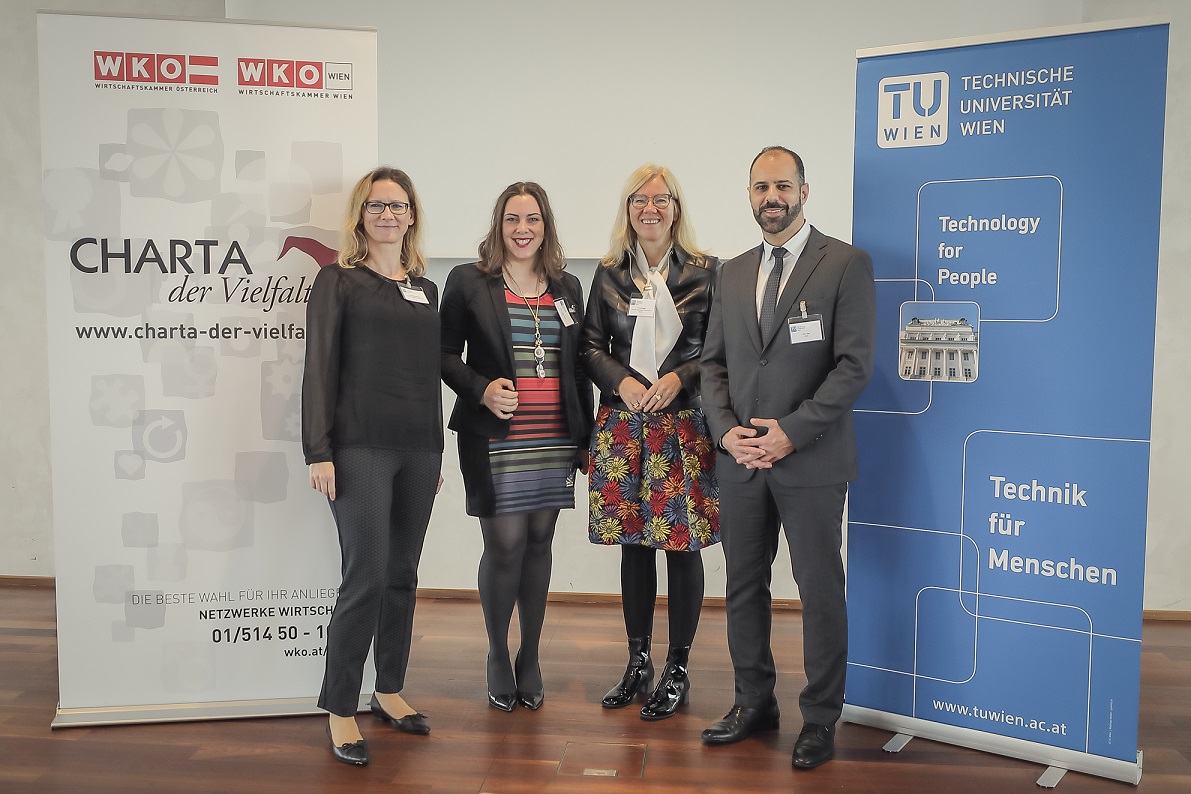Charter business breakfast – in the spirit secularity with a touch of the spiritual

date: 06/07/2020
Theme: What do you think about faith?
Around 20 of our signatories participated at the world’s largest energy house above the roofs of Vienna, enhancing the event with interesting discussions and ideas. The topic of the jointly organised business breakfast was: “What do you think about faith?” (J.W. Goethe) - The Importance of the Religious Dimension in a Secular Organisation | Impulse Islamic scholar Dr. Farid Hafez. As always with this format, the focus was on the diversity agendas of our charter member companies.
The Vienna University of Technology has been pursuing the concept of diversity management since 2016 and especially since the beginning of 2018. As part of her welcoming speech, Mag. Anna Steiger, Vice Rector for Personnel and Gender, emphasised the importance of the gender quota regulated in the University Act and also addressed the problem of shortages of women amongst students in the fields of electrical engineering (10%) and computer science (17%). The Vienna University of Technology has already proven itself to have the best practices in this area as an award winner for the most family friendly company. Her global recruitment also sets a good example in terms of internationality. Many of the students have a Muslim background, and this brings with it an openness to new experiential values in terms of the religious dimension. People move away from the emotional track here and towards more objectivity.
Sarah Preuschoff, MSc, Director of the areas “Women in Business”, “Young Business” and “Diversity” welcomed participants on behalf of the Vienna Chamber of Commerce and shared her anticipation for the interesting meeting of the two stereotypical areas of technology and religion. She also welcomed the co-initiator and “EU Charter” representative Ms MMag. Margit Kreuzhuber (WKÖ, Deputy Head of the Social Policy Department).
Diversity management: Projects and activities of the Vienna University of Technology
The interesting projects and activities surrounding diversity management at the host company were presented by Louisa Holub, Diversity Officer at the Vienna University of Technology. There was initially no separate, central position for diversity management. The Works Council, the Working Group for Equal Opportunities (AKG), the Gender Competence Department, the Disabled Persons Representative (contact point for the students), the Disability Officer (contact point for the employees), the Compatibility Officer and the student body lecturers served as contact points in the event of discrimination. Now these bodies together form the so-called Diversity Board, which meets twice a year to specify planned measures and provide feedback.
After a project phase in 2016-2017, during which an analysis of the status quo was made and initial awareness-raising measures were carried out, diversity management was implemented in 2018 as a central, higher-level position. It is supported by one representative each from the research area and the teaching area.
At the strategic level, the focus was on increasing relevance and scope as well as increasing attractiveness for international employees and students. The organisational level aims to increase diversity skills and equal opportunities through transdisciplinary learning processes and partnerships, to promote individual potential and to create a positive overall atmosphere and appreciative communication culture. At the individual level, the focus is on raising awareness and reducing prejudices.
One of the challenges of TU Diversity Management is that the status as a so-called experts organisation (cf. Henri Mintzberg 1979) leads to a focus on technical skills (technical disciplines) while social skills play a rather subordinate role. Diversity management and the benefits from it are only experienced by a few. Since there is not a long tradition of dealing with “soft topics” such as gender and diversity, the Vienna University of Technology aims to raise awareness amongst employees and students for these topics. To achieve this, TU Diversity Management is pursuing the strategy of combining the top-down with a bottom-up approach.
Top-Down:
· Strategic focus set by the (vice) rectorate, based on the development plan and the performance agreement with the ministry
· Clarification of the strategic focus together with the Diversity Board
Bottom-Up:
· Initiatives by employees or students (HTU) are implemented and receive support and resources from TU Diversity Management
· The reach and acceptance for diversity issues should be increased by looking at specific needs
Importance of the Religious Dimension in a Secular Organisation
In conclusion, the external expert invited by the Vienna University of Technology, political scientist Dr. Farid Hafez, offered a short keynote speech on the “Importance of the Religious Dimension in a Secular Organisation”. Many organisations, institutions and companies have less experience in terms of diversity and religion than in other areas, which means high interest and exciting exchanges were inevitable.
Dr. Hafez provided a nice introduction to this very complex topic with the different definitions of secularity and religion. Given his background in racism research, he was able to provide an overview of the barriers to religious diversity and different forms of religious discrimination. The inclusion of religious difference would result in “broadening horizons, perspectives and ideas within the facility”, leading to “increased understanding” amongst each other and more “productivity and loyalty to the institution”. This could of course be extended to all six diversity dimensions. For example, many companies have a “Meditation Room” to ensure that people of all religions can meditate or pray. Dr. Hafez spoke in favour of promoting interactive coexistence in order to build mutual understanding and reduce prejudices.
